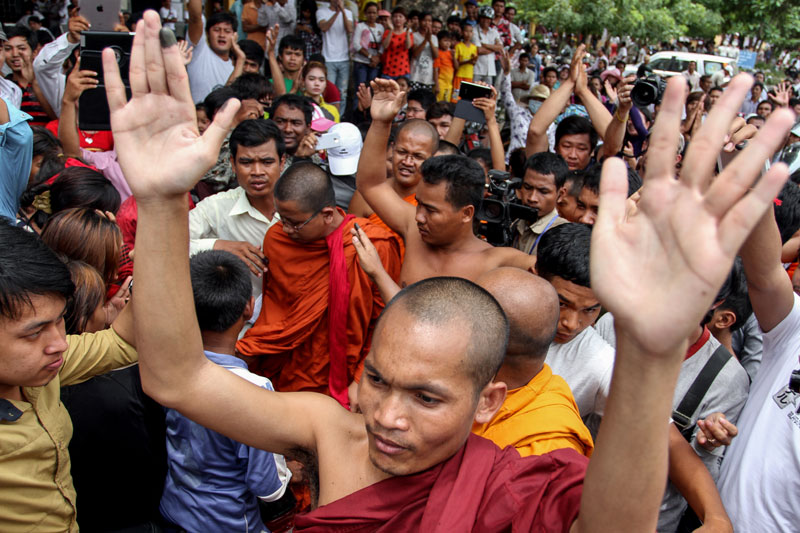Tep Vong, the great supreme patriarch of Cambodia’s Mohanikaya Buddhist sect, renewed his call Wednesday for monks not to vote or otherwise take part in the country’s elections, this time urging the government to put the restrictions into law.
Speaking at the annual gathering of the country’s top monks in Phnom Penh, Tep Vong said the legislation was necessary to protect the national religion’s hallowed image.

“I…ask the relevant establishments, the National Assembly, the Senate, the government and all political parties, to please create procedures to make the ordained monks and novice monks stay neutral…[and] avoid participating in activities that support or oppose any political party and participating in elections,” he said.
Tep Vong, previously a senior member of the ruling CPP, has in the past issued personal orders forbidding the country’s more than 50,000 monks from voting. His new call for a law follows elections last year in which hundreds of monks campaigned openly for the opposition CNRP, which officially lost but came within seven parliamentary seats of victory.
On Wednesday, just before requesting the voting ban, the Buddhist patriarch accused a few monks of threatening to drag the religion into disrepute.
“While there is progress,” he said, “we also see some weak points in the practices of a small number of monks who lack understanding, which seriously harms the respect for Buddhism and state law and leads the people to lose their belief.”
Bou Kry, supreme patriarch of the country’s smaller Dhammayuth sect, endorsed the call for a voting ban at the meeting.
Chhoeng Bunchhea, deputy director-general of Buddhist education for the Mohanikaya sect, who also attended the meeting, said afterward that Cambodia needed the law to maintain peace.
“If monks favor one side, they will lose their neutrality. That is why we ask the National Assembly to create a law for the monks,” he said. “When monks can vote, they will use that right to protest when votes are lost. They will participate with other people, and that can lead to violence.”
On election day last year, a brief but fiery riot broke out at a polling station in Phnom Penh after a young man allegedly assaulted a monk who was protesting against problems with the site’s voter list.
CPP lawmaker Chheang Vun, spokesman for the National Assembly, said he welcomed the patriarch’s call for a law.
“If there is a request for the monks to stay neutral and ban them from voting, I support it,” he said.
Mr. Vun said the timing of the request was also fortuitous, with the CPP and CNRP set to negotiate an overhaul of the country’s election laws.
The opposition, however, saw things differently.
Son Chhay, a senior lawmaker for the CNRP, said it was Tep Vong who was taking sides, by demanding that monks’ right to cast a ballot be taken away.
He said the Buddhist leader was merely doing the bidding of the CPP, which may be worried that its grip on the country’s pagodas will no longer be enough to keep the monks who live in them in line.
“The CPP has been trying to control the pagodas and all the monks, but I think they can no longer control them,” he said. “They control the pagodas, but they can no longer control the monks.”
Mr. Chhay said legally barring monks from voting would also take more than a few tweaks to the election laws. With the right to vote for every Cambodian citizen 18 years old and older enshrined in the Constitution, he said, it would take nothing less than a constitutional amendment.
And that would take a two-thirds vote in the National Assembly. With the CPP well shy of controlling that many of the Assembly’s seats, Mr. Chhay said an amendment taking the right to vote away from monks was not likely to pass.
“The CPP is no longer able to do what they please anymore, and the CNRP, we are in the position of supporting the rights of all people, and I doubt we would support this.”
Among the most vocal CPP critics in the clergy’s ranks in the past two years has been But Buntenh, who founded the Independent Monk Network for Social Justice as a counterpoint to a Buddhist establishment.
Like Mr. Chhay, he called Tep Vong a puppet of the ruling party.
“This kind of idea comes from the ruling party,” he said of the patriarch’s call for monks to be barred from the ballot. “The ruling party knows very well that if it allows the monks to keep voting, it will not be the winner.”
And more than the monks alone, he said, the CPP fears that the public support of monks for other parties will sway the population.
As for the standard complaint from the government and Buddhist leaders that activist monks threaten the country’s social order, But Buntenh said he and his cohorts were trying to set Cambodia back on the true Buddhist path—not stray from it—and that voting for the “right” leader was a part of that.
“We are trying to have a person who has a high quality of virtue,” he said.
“I suggest the government should not look only at the political interest but look at the interest of the people and look at the interest of the whole country.”